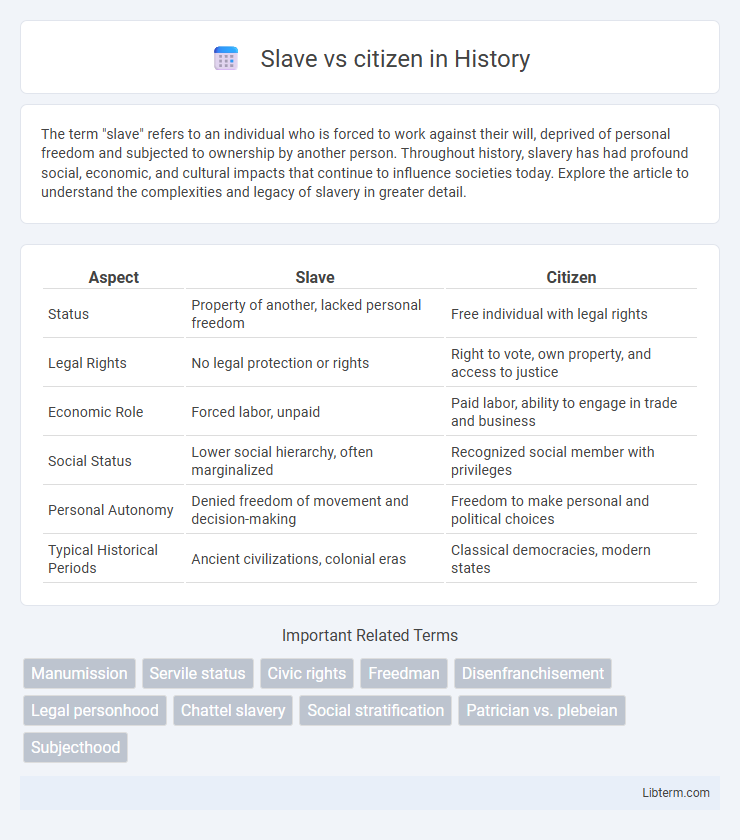The term "slave" refers to an individual who is forced to work against their will, deprived of personal freedom and subjected to ownership by another person. Throughout history, slavery has had profound social, economic, and cultural impacts that continue to influence societies today. Explore the article to understand the complexities and legacy of slavery in greater detail.
Table of Comparison
| Aspect | Slave | Citizen |
|---|---|---|
| Status | Property of another, lacked personal freedom | Free individual with legal rights |
| Legal Rights | No legal protection or rights | Right to vote, own property, and access to justice |
| Economic Role | Forced labor, unpaid | Paid labor, ability to engage in trade and business |
| Social Status | Lower social hierarchy, often marginalized | Recognized social member with privileges |
| Personal Autonomy | Denied freedom of movement and decision-making | Freedom to make personal and political choices |
| Typical Historical Periods | Ancient civilizations, colonial eras | Classical democracies, modern states |
Understanding the Concepts: Slave and Citizen
A slave is an individual legally owned by another person, deprived of personal freedom and forced to perform labor or services without compensation or rights. In contrast, a citizen is a recognized member of a political community with inherent rights, responsibilities, and protections under the law, including participation in governance and access to public services. Understanding these concepts highlights fundamental differences in autonomy, legal status, and social inclusion within various historical and modern contexts.
Historical Contexts: Development of Slavery and Citizenship
Slavery historically developed as a system where enslaved individuals were deprived of legal rights and considered property, especially prominent in ancient civilizations like Greece, Rome, and the Americas during colonial periods. Citizenship, on the other hand, evolved as a legal status conferring rights, protections, and participation in civic life, shaped by political philosophies in Greek city-states and later democratic states. The contrast between slaves and citizens underscores the fundamental distinctions in social hierarchy, legal identity, and human rights across different historical contexts.
Legal Rights: Distinctions Between Slaves and Citizens
Slaves were denied basic legal rights such as owning property, entering contracts, or accessing the court system, whereas citizens enjoyed full legal protections and the ability to participate in civic duties. Citizens possessed the right to vote, hold public office, and seek legal recourse, rights systematically withheld from slaves. The legal framework rigidly enforced these distinctions, ensuring slaves remained under complete control and devoid of personal autonomy.
Social Status and Identity: Slave vs. Citizen
Social status defined the stark divide between slaves and citizens in ancient societies, where slaves were considered property lacking personal rights and legal identity, while citizens enjoyed full political participation and social recognition. Citizens possessed privileges such as owning property, voting, and access to legal protection, reinforcing a sense of belonging and autonomy absent in the enslaved population. The identity of slaves was shaped by subjugation and labor, contrasting sharply with the citizen's status rooted in civic duty and societal inclusion.
Economic Roles: Contributions to Society
Slaves in ancient economies provided essential labor in agriculture, mining, and domestic tasks without remuneration, significantly boosting production and wealth accumulation for slaveholders. Citizens, by contrast, engaged in skilled trades, governance, and military service, contributing to economic stability and institutional development. The combination of enslaved labor and citizen participation created a complex economic system that supported societal growth and cultural advancement.
Political Participation: Exclusion and Inclusion
Slaves were systematically excluded from political participation, lacking any legal rights or representation in governance, which upheld their status as property rather than individuals. Citizens, conversely, possessed defined political rights including voting, holding office, and influencing policy, forming the core of participatory democracy and civic engagement. This stark contrast in political inclusion underpinned social hierarchies and legal distinctions, shaping the distribution of power and societal roles within historical polities.
Freedom and Autonomy: Contrasts in Daily Life
Slaves endured severe restrictions on freedom and autonomy, subjected to constant control and lacking personal agency in daily decisions. In contrast, citizens exercised legal rights, owned property, and participated in social and political activities, enabling greater control over their lives and movements. The fundamental distinction manifests in the ability to make choices, with slaves bound by coercion and citizens endowed with self-determination.
Pathways to Citizenship and Emancipation
Pathways to citizenship and emancipation for slaves historically involved legal reforms, manumission, and wartime decrees that gradually recognized enslaved individuals' rights. Laws such as the Emancipation Proclamation in the United States and gradual abolition statutes in Europe created structured means for slaves to acquire citizenship status. These processes were often contingent upon conditions like enlistment in the military, payment for freedom, or legislative acts granting personal liberty and political inclusion.
Impact on Modern Society: Lessons from History
The historical distinction between slaves and citizens underscores the fundamental principles of human rights and equality that shape modern democratic societies. The abolition movements and civil rights advancements highlight the ongoing struggle for social justice and the importance of legal frameworks that protect individual freedoms. Understanding these lessons informs policies against discrimination and promotes inclusive governance in contemporary communities.
Ethical Perspectives: Slavery, Citizenship, and Human Rights
Slavery fundamentally violates the core principles of human rights by denying individuals autonomy, freedom, and equality, which are intrinsic to ethical citizenship. Ethical perspectives emphasize that citizenship entails not only legal status but also the protection of inalienable rights and participation in societal duties. Modern human rights frameworks condemn slavery as an immoral institution incompatible with the dignity and ethical responsibilities inherent in citizenship.
Slave Infographic

 libterm.com
libterm.com